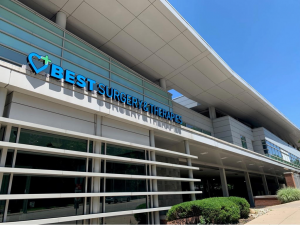Rotator Cuff Tear
In each one of the shoulders, the rotator cuff is a collection of muscles and connective tissue that connects the upper arm to the shoulder blade. The rotator cuff enables rotation and other movement needed during daily activities. Due to the amount of heavy lifting and strenuous movements we place on our shoulders at work or while playing sports, injuries to the rotator cuff are very common.
Whether you have a rotator cuff tear or are seeking information on potential causes of shoulder pain, please take a moment to review our guide. If you’d like to learn more or have any questions about our treatment options, don’t hesitate to get in touch with a member of our team.
Causes
The rotator cuff is made of four muscles and connective tendons that wrap around the upper arm bone, holding it in place to a socket in the shoulder.
Since this is a relatively delicate connecting point that handles a heavy load, rotator cuff injuries including sprains, strains, and tears are fairly common.
Rotator cuff tears can be both acute, meaning they occur instantly due to excessive trauma, or degenerative, meaning they develop over time due to repetitive motions and natural wear and tear.
Tears to the rotator cuff can happen on any of the four muscles and tendons. They can be both partial and full. Frequent causes of rotator cuff tears include:
- Falls
- Lifting heavy objects, particularly with a jerking motion
- Repetitive swinging motions, including swinging a golf club or tennis racket
- Natural changes that weaken connective tissue include reduced blood flow and the development of bone spurs
Treatment
In very many cases, a course of initial treatment can help relieve pain and improve function without the need for surgery. Effective and often-recommended therapies include:
- Rest and limiting strenuous arm movements
- Over-the-counter pain relievers
- Alternating hot and cold compression to ease inflammation and relax muscle tension
- Physical therapy to strengthen supporting muscles, improve range of motion and learn safer shoulder mechanics
- Pain management injections to reduce inflammation for periods of weeks and months
Less serious rotator cuff injuries and tears can heal on their own. However, if symptoms do not improve and the tear does not seem to be progressing in the right direction, surgery can become a consideration to restore function and relieve pain.
Symptoms
The most common symptoms of a rotator cuff tear include:
- Pain that is present while not moving the arm, including at night while sleeping
- Sharp pain as a result of lifting the arm or performing specific rotations
- Popping and cracking sensations during certain movements
- Weakness when lifting the arm or performing rotational motions
Since symptoms can be similar to other rotator cuff injuries or even conditions like arthritis, it is important to see a doctor for a full diagnosis. Treating a rotator cuff tear as early as possible during the treatment process can help ensure the injury does not worsen and heals properly.
Diagnosis
For shoulder pain that is limiting regular activities and does not improve in a short period of time, patients should see a qualified doctor for diagnosis and treatment.
To determine if a rotator cuff tear is the primary cause, doctors can perform an evaluation that includes:
- Questions about specific symptoms and daily activities
- Reviewing your medical and injury history
- Performing a hands-on examination of range of motion and painful spots
Ordering diagnostic tests such as an MRI or X-ray
Upon diagnosis of a rotator cuff tear, doctors will usually recommend rest and basic treatments to see how the tear heals in all but the most severe cases.
Surgery
Patients who are good candidates for rotator cuff repair shoulder surgery have usually had pain for at least six months, have a larger tear but good surrounding tissue, or are experiencing significant weakness and loss of movement.
Rotator cuff repair procedures involve the surgeon accessing the shoulder and reattaching the tendon to the top of the arm. Due to advances in surgical technology and techniques, these procedures can often be performed on an outpatient basis.
Reach Out to BEST Health System today
To learn more about the treatments available at our state-of-the-art facilities to treat rotator cuff tears, please contact us today. We’ll help you understand your options so you can start your journey to relief. Our goal is to help patients get back to a healthy and active lifestyle.
If you have experienced any of these symptoms or recieved a diagnosis and need treatment, BEST can help. Take the first step towards relief today.
Related Articles
A Map of BEST Health System's Ohio Locations
BEST – The Health System Redefining Care Throughout Ohio BEST Health System is a modern healthcare system with accessible locations throughout the state of Ohio. […]
A Checklist for Car Accident Survivors
The Risk of Driving In the case of a car accident, it only takes a few seconds for everything to change. It has been estimated […]
A Guide to Swimmer’s Shoulder | BEST
What is Swimmer’s Shoulder? Swimmer’s shoulder, also known as shoulder impingement, is a repetitive motion injury that causes inflammation of the tendons and other soft […]


